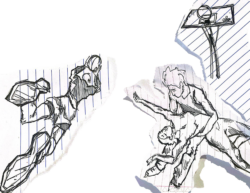On March 25, 2007, I learned what the NCAA men’s basketball tournament can do to one’s heart. I was thirteen years old and my beloved North Carolina Tar Heels were rolling through the postseason. UNC was a number one seed and boasted a starting lineup with four future NBA players, the perfect recipe for a deep tournament run. As a naïve adolescent, my thought process was very simple: my favorite team has the best players, therefore they cannot lose.
Of course, as bracket-fillers rediscover each year, that simple logic does not apply to March Madness, a reality I was introduced to in particularly brutal fashion. One game away from the Final Four, UNC’s Elite Eight matchup was with a team called Georgetown—oh, the irony. I knew the Hoyas had a tall guy named Roy Hibbert and a pretty good player named Jeff Green, but, regardless, I was absolutely convinced this game was just another stepping stone in UNC’s inevitable rise to the top.
With six minutes left in the game, UNC led by ten points. But the Hoyas wouldn’t go away, erasing the Tar Heels’ lead and forcing overtime. At this point, my parents were on damage control. As basketball fans themselves, they understood that Georgetown had the momentum and was likely to carry it over into overtime—in other words, UNC was going to lose and they knew I was in complete denial. As the Hoyas started to build an insurmountable lead, tears started flowing. Despite the fact that I was about to go to church and it was my sister’s eighteenth birthday (sorry, Caitlin), I barely spoke for the rest of the day.
This emotional upheaval is what the NCAA tournament does to people. Its design is cruel, its results are unpredictable, and the games are always close. It’s like the basketball gods decided that not only will your team most likely lose at some point during the tournament, but that it will probably be in a particularly excruciating way. Underdogs are empowered, and favorites experience incredible vulnerability, and, for that reason, fans simply cannot miss a game. The stakes are just too high.
At a point, it stops being fun. As your favorite team advances farther and that bracket shrinks, the closer and closer the glory gets. Then, unless you are a member of the one out of 68 fan bases that remains standing at tournament end, you get dealt a full dose of disappointment. The final buzzer sounds and everything ends in the blink of an eye. The tournament moves on and your team is quickly forgotten.
So why do we fill out brackets each year, cry over close losses, and always lose to someone in bracket pools who knows nothing about college basketball? Why do we choose to welcome such suffering? Because when you’re a fan of that team, that one team, that cuts down the nets in early April, with no more opponents to face, there is no better feeling for a sports fan.
In 2009, just two years removed from the Georgetown debacle, UNC captured the NCAA title. Seeing them pile onto each other near half court, jumping around like children who had just spotted an ice cream truck, there was an undeniable feeling that a little bit of that championship trophy belonged to us, the fans. Not literally, of course, but for a fan base that had weathered the ups and downs, it was liberating to see success for the Tar Heel players and coaches.
Today, I am a fan of Georgetown, who failed to make the NCAA tournament this year. I will probably root for UNC subconsciously, but more than anything I will enjoy the tournament. I will inevitably spend too much time filling out brackets, only to crash and burn with the rest of America. I will watch every minute of every game, hoping and waiting for the moments that will join my catalog of the unforgettable. I won’t cry this year (hopefully…), but I will be sad when the last game ends. Because there is a certain magic to March Madness that exists in no other sport, and that’s something I’ll hold on to until the day I die.




